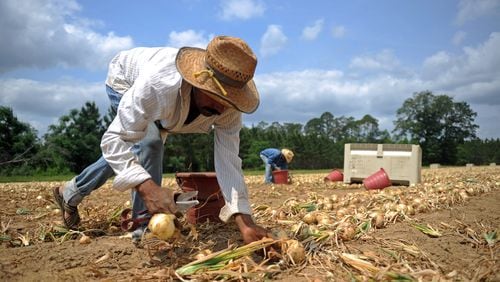Federal investigators announced today they are finding labor abuses in the overwhelming majority of agricultural worksites inspected in the Southeast.
Last year, the U.S. Department of Labor investigated 240 suspected violations of labor laws by agricultural employers in eight states, including Georgia: They found violations in 90% of those investigations.
Employers in the Southeast region where investigations were conducted are increasingly relying on the H-2A agricultural guest worker program, which is administered by DOL in cooperation with state authorities. The program allows migrant farm workers to stay in the U.S. for a limited time to help with crop harvests. In Georgia, temporary guest workers from Latin America account for a critical wedge of the agricultural workforce. Last fiscal year, a high of 37,536 workers crossed the border to legally come work in the state.
There are strict rules that govern how much H-2A workers must be paid — in Georgia, their wages increased this year to $14.68 per hour — and what standards their employer-provided housing must meet. But advocates say violations are common. Georgia became the face of H-2A program abuse in 2021, when law enforcement indicted two dozen people in a case of what investigators called “modern-day slavery.”
DOL’s 2023 enforcement statistics released today indicate there was less compliance last year in the Southeast than the year before. In 2022, 220 investigations resulted in violations being found 85% of the time.
In response to the violations found in the region in 2023, the federal government recovered more than $2 million in back wages for nearly 3,000 workers, and assessed employers with more than $3.8 million in civil penalties.
Based on their findings, DOL also debarred 8 Southeast growers and farm labor contractors in 2023, imposing years-long bans from bringing in foreign farmworkers into the country through the H-2A program. Two of those employers were in Georgia: one in Moultrie and the other in Pearson.
In Georgia, federal authorities conducted 57 agricultural investigations in 2023, 50 of which uncovered violations. DOL recovered just over $250,000 in back wages and damages for 424 workers, and it imposed $630,769 in civil money penalties.
“The U.S. Department of Labor is committed to protecting dedicated farm workers who put food on America’s tables,” said Juan Coria, Atlanta-based regional administrator for DOL’s Wage and Hour Division (WHD), in a statement. “When employers attempt to unlawfully increase their profits at the expense of the dignity, respect and, in some cases, freedom of workers, we will use every tool at our disposal to hold them accountable.”
In its report, DOL said it will continue to conduct “vigorous investigations” as the 2024 growing seasons approaches. In parallel, the agency says it is working on lowering the number and rate of violations through robust outreach to employers and workers alike.
“Our enforcement and educational efforts go hand-in-hand. When workers are aware of their rights and understand they have a channel to discuss their wage concerns with us without fear of retaliation, it makes it harder for wage theft to go unpunished,” Coria said.
For farmworkers in the H-2A program, reporting abuse is fraught because workers’ visas and legal status in the country is directly tied to their employers. There is widespread fear that speaking up could compromise their status or result in fewer opportunities to come back to the country as H-2A workers, advocates say. Undocumented immigrant workers, meanwhile, tend to be hesitant about reaching out to law enforcement. In 2019, roughly 45% of agricultural workers in the Southeast lacked legal status, according to federal data.
To assuage workers’ concerns of deportation or immigration-related retaliation by an abusive employer should they speak up, the Biden administration created a program last year that streamlines the process for immigrant victims of labor violations to obtain deportation protections.
“Unscrupulous employers who prey on the vulnerability of noncitizen workers harm all workers and disadvantage businesses who play by the rules,” said Secretary of Homeland Security Alejandro N. Mayorkas at the time. “We will hold these predatory actors accountable by encouraging all workers to assert their rights, report violations they have suffered or observed, and cooperate in labor standards investigations.”
The Atlanta Journal-Constitution and Report for America are partnering to add more journalists to cover topics important to our community. Please help us fund this important work at ajc.com/give







